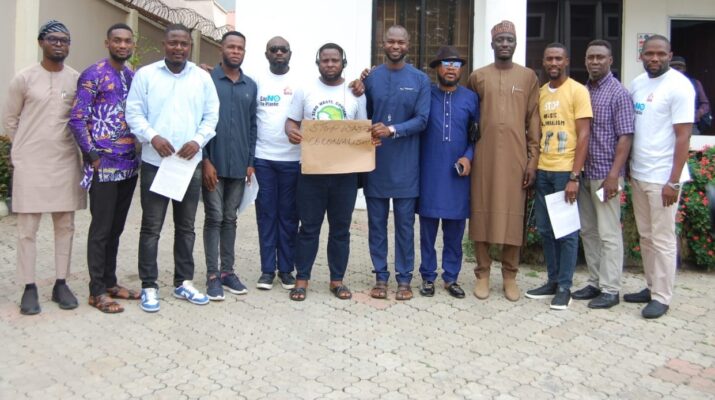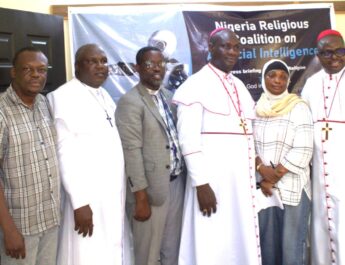Civil Society Organsations (CSOs) have exposed Nigeria’s role in what they described as ‘waste colonialism’ as powerful and developed countries of the European Union (EU) turns Nigeria and the African Continent into a dumping ground for their non-hazardous wastes
By Edu Abade
Civil Society Organizations (CSOs) in Nigeria have strongly condemned the Federal Government’s bid to import non-hazardous waste from the European Union (EU), warning that such a move could exacerbate the country’s waste management crisis and create health hazards of unimaginable proportions.
This is coming on the heels of Nigeria and 23 other non- Organisation for Economic Co-operation and Development (OECD) countries application to the European Commission (EC) for inclusion on the list of nations eligible to import waste from the EU ahead of the deadline for applications.
In a joint statement, Nigerian environmental groups-including members of the Global Alliance for Incinerator Alternatives (GAIA) Nigeria, Community Development Advocacy Foundation (CODAF), Environmental Defenders Network (EDEN), Zero Waste Ambassadors (ZeWA) and the Renevlyn Development Initiative (RDI) denounced the government’s involvement in what they tagged: “waste colonialism.”
The groups, which cautioned the Federal Government to avert a waste management crisis, highlighted Nigeria’s severe waste management challenges, noting that the country generates over 32 million tons of waste annually.
“Lagos alone produces about 13,000 metric tons of waste daily, yet a significant portion remains uncollected, ending up in open dumpsites, drains, or being burned. This lack of proper waste management leads to severe environmental and public health hazards.
“The informal waste sector plays a crucial role in waste collection and recycling, yet it operates with little recognition or support. The lack of investment in environmentally sound management of waste, recycling facilities and more importantly reducing upstream plastic production, further worsens the situation, leaving Nigeria to bear the burden,” statement reads.
Speaking on behalf of GAIA Nigeria members, Dr. Leslie Adogame, emphasized the devastating impacts of poor waste management, saying: “Plastics clog waterways, causing severe urban flooding, while open burning of waste releases toxic chemicals, leading to respiratory diseases. Additionally, landfill leachates contaminate soil and groundwater, posing long-term risks to food security and public health.”
He also pointed out the dire working conditions of informal waste pickers, who handle much of the country’s recycling without protective gear, exposing them to injuries and illnesses. “The uncontrolled disposal of waste also threatens biodiversity, as plastics and other pollutants harm marine and terrestrial ecosystems,” he added. As if not enough, Nigeria till date does not have any sanitary landfills to manage its increasing land based waste.
According to the obligations of the application to import waste from the EU-non-OECD countries must demonstrate their ability to manage the waste they wish to import from the EU in an environmentally sound manner under conditions equivalent to those applying in the EU. Such equivalence ceases to exist as Nigeria continues to grapple with its current waste complexities and adversities.
On why importing waste remains a dangerous move, Coordinator of Zero Waste Ambassadors and Lead of Governance Reforms and Anti-Corruption at Policy Alert, Faith Paulinus, questioned the rationale behind Nigeria’s application to import EU waste at a time when the country is grappling with weak enforcement of waste policies, limited recycling infrastructure, and low public awareness of sustainable waste practices. “The government struggles with inadequate funding for waste management programs, leaving Nigeria reliant on informal and often unsafe waste disposal methods,” he noted.
Echoing these concerns, Executive Director of EDEN, Barrister Chima Williams, who warned that Nigeria’s waste management systems are already overwhelmed, stated: “Additional imports could overburden landfills, worsen pollution, and further strain our already inadequate recycling infrastructure. This influx could also discourage domestic waste reduction efforts such as the recent single-use plastic ban and undermine local recycling industries.”
He added that weak enforcement of waste regulations raises the risk of mismanagement, leading to further environmental and health crises. “This decision contradicts Nigeria’s commitment to sustainable waste management and could turn the country into a dumping ground for Europe’s waste.”
Executive Director of CODAF, Richard Benin, who called for immediate action against the move, reminded the government that Nigeria’s decision to increase its Nationally Determined Contributions (NDCs) from 43 percent to 45 percent was partly due to commitments in the waste management sector. “Nigeria must ban waste imports and focus on managing local waste rather than becoming a dumping ground for foreign waste. The government should above all, commit to a global reduction target on plastic production within the context of the Global Plastics Treaty, invest in environmentally sound recycling infrastructure, strengthen waste reduction policies, support informal waste pickers, implement Extended Producer Responsibility (EPR) and promote public awareness campaigns on waste management and recycling,” he stated.
The CSOs urged the government to reject the importation of waste and prioritize sustainable waste management strategies that empower local communities and safeguard public health. This is especially crucial in light of the EU’s upcoming ban on exporting plastic waste to non-OECD countries, set to take effect on November 21, 2026. Allowing such imports would essentially be an act of perjury.
More than 27 years later, it is high time that Nigeria ratifies and fully implements the Bamako Convention on the Ban of the Import into Africa and the Control of Trans-boundary Movement and Management of Hazardous Wastes not only the health of the environment, but that of her people.
The Health of Mother Earth Foundation (HOMEF) had earlier maintained that even wastes certified as non-hazardous are often hazardous, as they have been widely known to contain traces of heavy metals and other dangerous elements.
“We denounce the ploy, under any guise, to import any form of waste to Nigeria. It is clear that rich countries commodify waste and make it appealing to the appetites of poorer countries that are seeking foreign exchange by all means.
“As such, the EU could report that €18.5 billion worth of waste was exported from the continent in 2023. What the impacts of those wastes have been and will continue to be in the countries where they were exported is a question that the trade merchants will never answer.
“The EU seem to align with the assertion of Lawrence Summers, World Bank Chief Economist in 1991, who wrote that Africa is hugely under polluted and that it makes economic sense to dump wastes here. In his memo, he said: “Just between you and me, shouldn’t the World Bank encourage more migration of the dirty industries to the Least Developed Countries (LDCs)?
“A given amount of health-impairing pollution should be done in the country with the lowest cost and the country with the lowest wages. I think the economic logic behind dumping a load of toxic waste in the lowest wage country is impeccable and we should face up to that.”
“In a world that is in the grip of extreme geopolitical distortions, the shameful truth is that the high consumption nations are happy to offload their wastes on zones regarded as suitable for nothing except to be sacrificed as refuse dumps.”
The group cited the dumping of toxic waste in Koko, Delta State, Nigeria in 1988, adding: “These wastes were labeled “non-hazardous” and branded as “fertilizers.” While the labeling was to portray no harm, the actual content was indeed harmful, with significant impacts and contamination on air, water and land. We also remember the Trafigura case of waste dumping in Côte d’Ivoire (after several unsuccessful efforts to dump wastes in several other countries) for an induced fee of about $17,000 with the help of local collaborators in the name of waste management companies.
“The hazardous nature of the wastes was concealed and became known only after other countries refused. We see the request for Inclusion in the List of Countries to Which the Export from the European Union of Non-Hazardous Wastes and Mixtures of Non-Hazardous Wastes Destined for Recovery is Authorised” as a ploy to woo countries like Nigeria into obnoxious systemic legal waste colonialism.”
Reacting to the move, Executive Director of HOMEF, Nnimmo Bassey as said: “Nigeria and other African countries have become dumpsites for thousands of obsolete and unusable computers and other e-waste. Major sources of the e-waste include China, the United States, Spain, the United Kingdom, the United Arab Emirates (UAE) and Morocco.
“Nigeria is already plagued with environmental pollution arising from oil and gas exploitation, pollution arising from the exploitation of solid minerals, plastic pollution, and genetic pollution in foods. For a country already almost overwhelmed by these issues, seeking approval to import waste of any kind is not only ill-advised but also ecocidal and dangerous.
“This move exposes the government’s willingness to discount the wellbeing of citizens for a mess of porridge. It is inconceivable that a nation with life expectancy of about 56 years and a broken healthcare delivery system would succumb to the level of begging to import someone else’s waste, when we can hardly handle our domestic wastes.”
HOMEF and other well-meaning Nigerians reject the Nigerian government’s plot to allow other countries and regions to use Nigeria or any other African nation as dumpsites for waste products from their conspicuous consumption.




